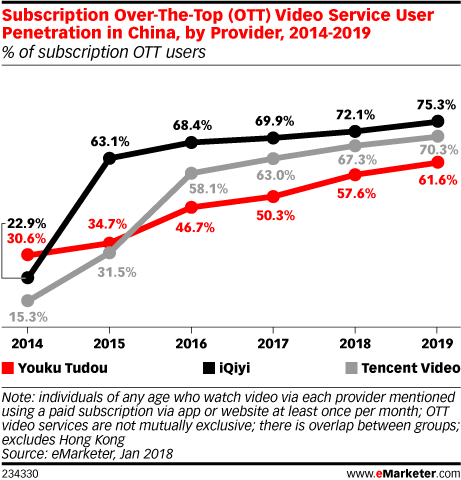Why iQIYI Is Overvalued Compared To Netflix
Jul. 20, 2018 3:16 AM ET
Summary
Bulls believe that iQIYI is similar to Netflix, so the two should share a similar valuation.
Adjusted for purchasing power, a Chinese subscriber is only 28% as valuable as an American subscriber.
The adjusted value of a Chinese subscriber shows that iQIYI is in fact trading at a premium to its fair value per subscriber.
The fair value per subscriber fluctuates with Netflix's stock. This calls into question if Netflix deserves its sky high valuation in the first place.
Competition in China is more intense than what Netflix experienced early in its history, making market share gains more difficult.
iQIYI ( IQ) has received general praise among investors due to its similarity to Netflix ( NFLX) and currently the stock appears to be trading at a substantial discount. If two companies are alike, then surely an investor should purchase the stock that trades at a significant discount to the other right? I disagree.
Not Undervalued Relative To Netflix I see multiple problems with the comparison to Netflix. For one, it is not clear to me why Netflix deserves its current valuation in the first place (read A Hard Look At Netflix’s Content); secondly, the market rarely ascribe the same valuation premium to multiple companies. Only the “fan favorite” of the industry gets the premium because it is the company in that industry; you simply can’t have two number ones.
I also have problems with how subscribers are being valued. One can’t just assign a dollar value per subscriber as implied by the Netflix market cap and apply that to the number of iQIYI subscribers due to the vast discrepancy in purchasing power.
Investing City outlined the difference between Netflix’s and iQIYI’s valuation in his article:
Company
| Market Cap
| Subscribers
| Value Per Subscriber
| Netflix
| $170 billion
| 125 million
| $1,360
| iQiyi
| $30 billion
| 51 million
| $588
| His conclusion was that the market had been significantly undervaluing iQIYI based on its low value per subscriber. I disagree with this assessment.
According the World Bank, China’s GDP per capita PPP, which normalizes for the purchasing power of a dollar regardless of the exchange rate, was only $16,807 in 2017, a mere fraction of U.S.’s GDP per capita PPP of $59,532. In other words, the average Chinese citizen lives the lifestyle of someone who makes just $16,807 in the U.S.
If we were to discount the value of the average Chinese user using GDP per capita PPP, iQIYI’s fair value per subscriber come out to $384, or 35% lower than Investing City’s assessment.
Note that the numbers have changed as share prices have moved. Here’s the table using Thursday’s data:
Company
| Market Cap
| Subscribers
| Value Per Subscriber
| Netflix
| $158 billion
| 125 million
| $1,217
| iQiyi
| $23 billion
| 51 million
| $450
| Source: author’s calculation
As we can see, iQIYI’s valuation has dropped along with that of Netflix. However, if we apply the same discount as before, the conclusion is still the same. iQIYI’s fair value per subscriber becomes $343, still 24% lower than the current implied value, 42% lower than the original $588 per subscriber figure, and 11% lower than my previous calculation of fair value per subscriber.
The sharp decline in the fair value per subscriber for iQIYI illustrates the problem that I shared with you in the introduction: if you peg your fair value to a potentially overvalued asset, then your fair value will fall along with that asset. Of course, time will tell whether Netflix is fairly valued today or not, but the implication will never change: if you peg iQIYI’s valuation to Netflix, you not only have to be comfortable with iQIYI, you also must be comfortable with Netflix’s valuation.
Different Competitive Landscape Netflix had a tremendous head start in streaming, only recently have competitors such as Disney ( DIS) and Fox ( FOX) begun to heavily promote their own OTT offerings. On the other hand, three major OTT services have emerged in China with very close penetration rates.

Source: emarketer.com
As the graph above shows, market share between services is very close. Contrast this with Hulu, which has just 20 million domestic subscribers versus Netflix’s 57 million, a 65% shortfall. The intense competition in China will likely increase the capital needed to gain market share in the future. Netflix today has to increase content significantly in an attempt to fend off competitors, I foresee the same outcome for iQIYI.
Conclusion If we account for the discrepancy in purchasing power, iQIYI is in fact overvalued on a per subscriber basis when measured against Netflix. Netflix’s stock price will also significantly impact the fair value of iQIYI under this approach, so not only does an investor need to be wary of risks related to iQIYI, he or she must also be comfortable with Netflix’s sky high valuation today. In addition, iQIYI does not have the head start that Netflix enjoyed in the past. Heightened competition means that growth will unlikely be capital efficient, not unlike the situation that Netflix is facing today as it pours billions of dollars into original content.
seekingalpha.com |





